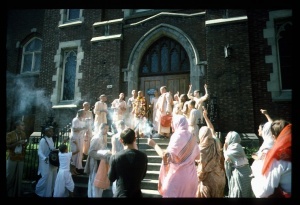CC Madhya 18.190: Difference between revisions
No edit summary |
(Vanibot #0054 edit - transform synonyms into clickable links, which search similar occurrences) |
||
| Line 17: | Line 17: | ||
<div class="synonyms"> | <div class="synonyms"> | ||
''tomāra śāstre'' | ''[//vanipedia.org/wiki/Special:VaniSearch?s=tomāra&tab=syno_o&ds=1 tomāra] [//vanipedia.org/wiki/Special:VaniSearch?s=śāstre&tab=syno_o&ds=1 śāstre]'' — in your scripture; ''[//vanipedia.org/wiki/Special:VaniSearch?s=kahe&tab=syno_o&ds=1 kahe]'' — it says; ''[//vanipedia.org/wiki/Special:VaniSearch?s=śeṣe&tab=syno_o&ds=1 śeṣe]'' — at the end; ''[//vanipedia.org/wiki/Special:VaniSearch?s=eka&tab=syno_o&ds=1 eka]-i [//vanipedia.org/wiki/Special:VaniSearch?s=īśvara&tab=syno_o&ds=1 īśvara]'' — there is one God; ''[//vanipedia.org/wiki/Special:VaniSearch?s=sarva&tab=syno_o&ds=1 sarva]-[//vanipedia.org/wiki/Special:VaniSearch?s=aiśvarya&tab=syno_o&ds=1 aiśvarya]-[//vanipedia.org/wiki/Special:VaniSearch?s=pūrṇa&tab=syno_o&ds=1 pūrṇa]'' — full of all opulence; ''[//vanipedia.org/wiki/Special:VaniSearch?s=teṅho&tab=syno_o&ds=1 teṅho]'' — He; ''[//vanipedia.org/wiki/Special:VaniSearch?s=śyāma&tab=syno_o&ds=1 śyāma]-[//vanipedia.org/wiki/Special:VaniSearch?s=kalevara&tab=syno_o&ds=1 kalevara]'' — bodily complexion is blackish. | ||
</div> | </div> | ||
Latest revision as of 22:20, 19 February 2024
Śrī Caitanya-caritāmṛta - Madhya-līlā - Chapter 18: Lord Śrī Caitanya Mahāprabhu's Visit to Śrī Vṛndāvana

His Divine Grace
A.C. Bhaktivedanta Swami Prabhupada
A.C. Bhaktivedanta Swami Prabhupada
TEXT 190
- tomāra śāstre kahe śeṣe ‘eka-i īśvara’
- ‘sarvaiśvarya-pūrṇa teṅho—śyāma-kalevara
SYNONYMS
tomāra śāstre — in your scripture; kahe — it says; śeṣe — at the end; eka-i īśvara — there is one God; sarva-aiśvarya-pūrṇa — full of all opulence; teṅho — He; śyāma-kalevara — bodily complexion is blackish.
TRANSLATION
“The Koran accepts the fact that ultimately there is only one God. He is full of opulence, and His bodily complexion is blackish.
PURPORT
The revealed scripture of the Muslims is the Koran. There is one Muslim sampradāya known as the Sufis. The Sufis accept impersonalism, believing in the oneness of the living entity with the Absolute Truth. Their supreme slogan is “analahak.” The Sufi sampradāya was certainly derived from Śaṅkarācārya’s impersonalists.